

Downloads. Physics and Astronomy, School of. Work-placement.pdf. Physics%20skills. Options with your subject: Physics. A physics degree sets you up well for research-based roles and positions in other sciences, it is also useful for careers in business, finance, IT and engineering...

Job options Jobs directly related to your degree include: Physics degree career options. One of the great benefits of studying physics is the employability and the wide range of potential career directions afterwards.
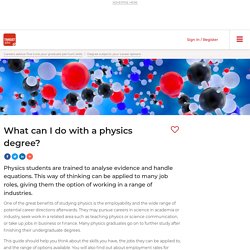
They may pursue careers in science in academia or industry, seek work in a related area such as teaching physics or science communication, or take up jobs in business or finance. Many physics graduates go on to further study after finishing their undergraduate degrees. This guide should help you think about the skills you have, the jobs they can be applied to, and the range of options available. You will also find out about employment rates for physics graduates, the areas of employment that attract them and the type of work they are likely to be doing six months after graduation.
What can I do with a physics degree? Skills Your head might be crammed full of useful (and some not-so-useful) information, but your physics degree will also help you to develop a wealth of useful skills… Advanced I.T.

Skills Microsoft office? Child’s play! What can I do with an astrophysics degree? Skills.
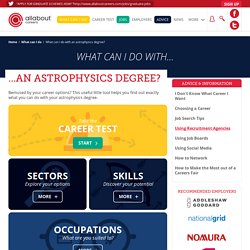
Your future with physics: Career directions. Physics graduates have a wealth of career opportunities open to them – so much so that it can get a little confusing.
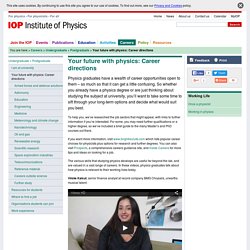
So whether you already have a physics degree or are just thinking about studying the subject at university, you’ll want to take some time to sift through your long-term options and decide what would suit you best. To help you, we’ve researched the job sectors that might appeal, with links to further information if you’re interested. For some, you may need further qualifications or a higher degree, so we’ve included a brief guide to the many Master’s and PhD courses out there. If you want more information, visit www.brightrecruits.com which lists popular career choices for physicists plus options for research and further degrees.
Careers information and resources. Physics Careers. Including astronomy, astrophysics and space science Physics is widely regarded as a demanding degree to get and employers know that to get a good physics degree, you have to be bright!
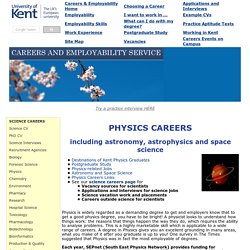
A physicist looks to understand how things work: the reasons that things happen the way they do, which requires the ability to analyse problems. This is a highly marketable skill which is applicable to a wide range of careers. PlanIT Plus - Career Zone. Physicists do experimental and developmental work in areas such as electronics, medicine, engineering, the environment, energy, nuclear physics, manufacturing and information technology.
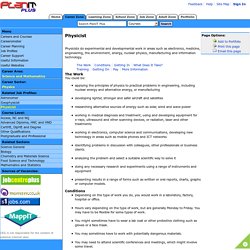
The Work You could be: Conditions Depending on the type of work you do, you would work in a laboratory, factory, hospital or office.Hours vary depending on the type of work, but are generally Monday to Friday. Physics World. IPEM > Careers & Training. Why choose this career?
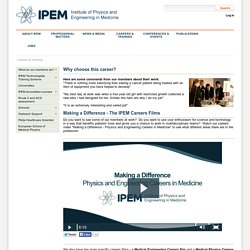
Here are some comments from our members about their work: "There is nothing more satisfying than seeing a cancer patient being treated with an item of equipment you have helped to develop" "My best day at work was when a four year old girl with restricted growth collected a new bike I had designed for her. Smiles like hers are why I do my job" DurhamUniversityMedicalPhysicsFINAL. Information technology. Working in physics: A fresh look at nuclear. A new industry-wide graduate scheme aims to get the next generation of nuclear scientists thinking about community and environmental issues from the outset.
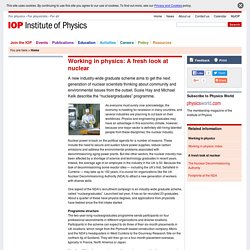
Susie Hay and Michael Kelk describe the “nucleargraduates” programme. As everyone must surely now acknowledge, the economy is heading for recession in many countries, and several industries are planning to cut back on their workforces. Physics and engineering graduates may have an advantage in this economic climate, however, because one major sector is definitely still hiring talented people from these disciplines: the nuclear industry. Nuclear power is back on the political agenda for a number of reasons. These include the need to secure and sustain future power supplies, reduce carbon emissions and address the environmental problems associated with decommissioning aging power plants. One aspect of the NDA’s recruitment campaign is an industry-wide graduate scheme, called “nucleargraduates”.
Ni booklet. Andrew Wallis. Careers using physics May 2015. Durham Careers Presentation New Template. NERT Durham TomOlbrich. Durham HE Careers 2. IOP Teacher Training Scholarships. £30,000 tax-free funding for talented individuals entering physics teacher training in England in the 2016/17 academic year. 150 IOP scholarships will be awarded to the very best individuals who impress us with their academic record, physics subject knowledge and commitment to teaching.
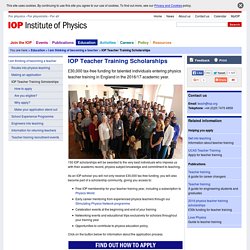
As an IOP scholar you will not only receive £30,000 tax-free funding, you will also become part of a scholarship community, giving you access to: Top maths and physics jobs from ecm selection, cambridge. Postgraduate. Studying for another qualification once you graduate from university might seem like the last thing you want to do after years of hard work. However, having a postgraduate qualification can open significant doors on your way up the career ladder, setting you apart from your competition. Modern physics research covers an enormous range of topics and disciplines. The different types of qualifications available to those with an undergraduate degree are listed below. You can also find details of the physics research going on nationwide in the Current Research in Britain guide and the IOP's own research guide.
Post Graduate Certificate in Education (PGCE)/Post Graduate Diploma in EducationThe PGCE/PGDE is the common qualification taken by those entering primary or secondary teaching. To find out if you are eligible for funding visit the Training and Development Agency (TDA) website. Return to top Master of Science, MScThese are taught postgraduate courses that specialise in a particular area. About Us. The Institute of Acoustics is the UK's professional body for those working in acoustics, noise and vibration.
It was formed in 1974 from the amalgamation of the Acoustics Group of the Institute of Physics and the British Acoustical Society (a daughter society of the Institution of Mechanical Engineers). The Institute of Acoustics is a nominated body of the Engineering Council, offering registration at Chartered and Incorporated Engineer levels. The Institute has some 3000 members from a rich diversity of backgrounds, with engineers, scientists, educators, lawyers, occupational hygienists, architects and environmental health officers among their number. This multidisciplinary culture provides a productive environment for cross-fertilisation of ideas and initiatives.
Physicsworld.com homepage. Nanotechnology.